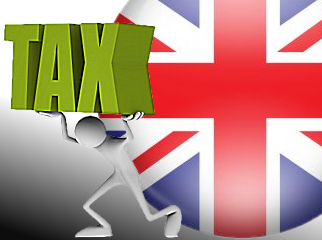When the new Tory-led government came to power in the United Kingdom, I was rather unimpressed.
David Cameron positioned himself as a British version of George W. Bush, full of “compassionate conservative” ideas to expand the burden of government.
But even worse than Bush, because Cameron also jacked up taxes when he first took office, including big increases in the capital gains tax and the value-added tax.
But I must admit that policy in recent years has moved in the right direction, at least with regard to corporate taxation.
Writing for the U.K.-based Telegraph, Jeremy Warner remarks that business activity has significantly strengthened.
A survey by EY, published on Monday, showed that the UK is continuing to pull away from the rest of Europe in terms of Foreign Direct Investment (FDI). The UK secured nearly 800 projects last year, the highest ever, accounting for around a fifth of all European FDI, far in advance of any other country. …Such investment is in turn helping to fuel Britain’s economic recovery… Go back 10 years and it was all the other way; companies were scrambling to leave the country and domicile somewhere else. It is perhaps the Coalition’s biggest unsung achievement that it has managed to reverse this flow.
So why has the United Kingdom experienced this economic rebound?
Lower corporate tax rates are key, Warner explains.
…it has done so largely through the tax system, where it has been as good as its promise to make the UK the most competitive in the G20. By next year, Britain will have the equal lowest headline rate of corporation tax – along with Russia and Saudi Arabia – in this eclectic group of economies, as well as at 20pc the lowest by some distance of the G7 major advanced economies. Other G7 countries range from 25pc to a crushing 38pc and 39pc in France and the US. …Britain has also halted the double taxation of repatriated foreign profits and the taxation of controlled foreign subsidiaries.
Recommended
So the 20 percent corporate tax rate has yielded good results.
Now let’s connect the dots.
 More economic activity means more income for taxpayers.
More economic activity means more income for taxpayers.
And more income means a bigger tax base.
Which means…can you guess?…yup, it means revenue feedback.
In other words, we have another piece of evidence that the Laffer Curve is very real.
…Reducing corporation tax has reversed the outflow of corporate head office functions, and doing so has substantially added to overall employment, output, income tax, national insurance and VAT receipts. Dynamic modelling by the UK Treasury has shown that lower tax rates are helping to drive a higher overall tax take. The “Laffer curve” lives. …Let business profit from its own enterprise. It’s amazing how effective this principle can be in generating growth, and yes, taxes, too.
If you want more evidence about the Laffer Curve, here’s one of the videos I narrated.
Warner points out, by the way, that the United Kingdom should not rest on its laurels.
If modest reductions in the corporate tax rate are good, then deeper cuts should be even better.
If comparatively minor changes like these to the competitiveness of the tax system can have such dramatic effects, just think what more serious, root and branch tax reform might achieve. In Singapore, the headline rate is 17pc, in Hong Kong 16.5pc and in Ireland just 12.5pc. There’s a way to go.
Though if The U.K. keeps moving in the right direction, that may arouse hostility and attacks from countries with uncompetitive tax systems.
Indeed, the statists at the European Commission have just launched an investigation of three countries for supposedly under-taxing companies.
Here are some blurbs from a report in the Wall Street Journal.
European Union regulators are preparing to open a formal investigation into corporate-tax regimes in Ireland, Luxembourg and the Netherlands… The probe by the European Commission, the EU’s executive arm, follows criticism in Europe of low tax rates paid by global corporations… The probe is likely to consider whether generous corporate-tax regimes in Ireland, Luxembourg and the Netherlands amount to illegal state aid. …The EU’s tax commissioner, Algirdas Semeta, has warned that the region “can no longer afford freeloaders who reap huge profits in the EU without contributing to the public purse.”
This is remarkable.
In the twisted minds of the euro-crats in Brussels, it is “state aid” if you let companies keep some of the money they earn.
This is horrible economics, but it’s even worse from a moral perspective.
A subsidy (or “state aid”) occurs when the government taxes money from Person A and gives it to Person B. But it’s a perversion of the English language to say that a subsidy takes place if Person A gets a tax cut.
By the way, this perverse mentality is not limited to Europe.
The “tax expenditure” concept in the United States is based on the twisted notion that a tax cut that results in more money in your pocket is economically (and morally) equivalent to a spending handout that puts more money in your pocket.
P.S. The United Kingdom also provides us with powerful evidence that the Laffer Curve plays a big role when there are changes in the personal income tax.
P.P.S. Notwithstanding a bit of good news on corporate tax, I’m not optimisticabout the U.K.’s long-run outlook. Simply stated, the nation’s political elite is too statist.























Join the conversation as a VIP Member